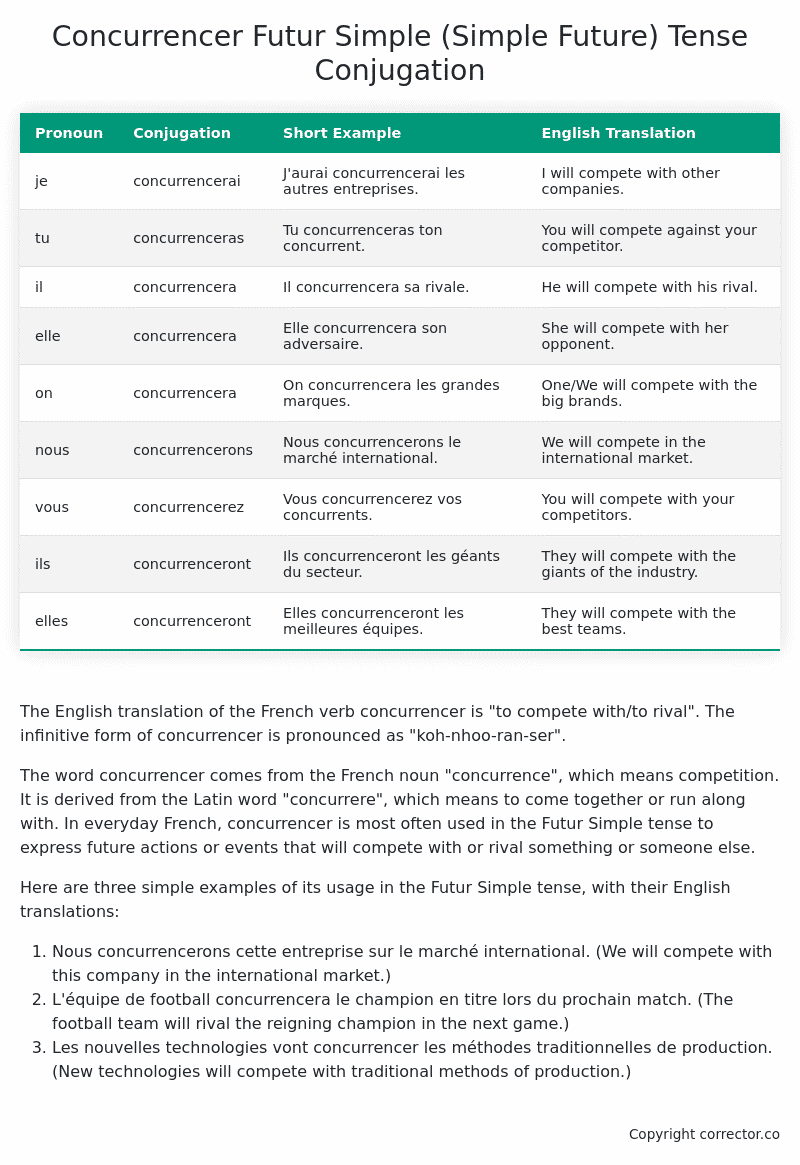Futur Simple (Simple Future) Tense Conjugation of the French Verb concurrencer
Introduction to the verb concurrencer
The English translation of the French verb concurrencer is “to compete with/to rival”. The infinitive form of concurrencer is pronounced as “koh-nhoo-ran-ser”.
The word concurrencer comes from the French noun “concurrence”, which means competition. It is derived from the Latin word “concurrere”, which means to come together or run along with. In everyday French, concurrencer is most often used in the Futur Simple tense to express future actions or events that will compete with or rival something or someone else.
Here are three simple examples of its usage in the Futur Simple tense, with their English translations:
- Nous concurrencerons cette entreprise sur le marché international. (We will compete with this company in the international market.)
- L’équipe de football concurrencera le champion en titre lors du prochain match. (The football team will rival the reigning champion in the next game.)
- Les nouvelles technologies vont concurrencer les méthodes traditionnelles de production. (New technologies will compete with traditional methods of production.)
Table of the Futur Simple (Simple Future) Tense Conjugation of concurrencer
| Pronoun | Conjugation | Short Example | English Translation |
|---|---|---|---|
| je | concurrencerai | J’aurai concurrencerai les autres entreprises. | I will compete with other companies. |
| tu | concurrenceras | Tu concurrenceras ton concurrent. | You will compete against your competitor. |
| il | concurrencera | Il concurrencera sa rivale. | He will compete with his rival. |
| elle | concurrencera | Elle concurrencera son adversaire. | She will compete with her opponent. |
| on | concurrencera | On concurrencera les grandes marques. | One/We will compete with the big brands. |
| nous | concurrencerons | Nous concurrencerons le marché international. | We will compete in the international market. |
| vous | concurrencerez | Vous concurrencerez vos concurrents. | You will compete with your competitors. |
| ils | concurrenceront | Ils concurrenceront les géants du secteur. | They will compete with the giants of the industry. |
| elles | concurrenceront | Elles concurrenceront les meilleures équipes. | They will compete with the best teams. |
Other Conjugations for Concurrencer.
Le Present (Present Tense) Conjugation of the French Verb concurrencer
Imparfait (Imperfect) Tense Conjugation of the French Verb concurrencer
Passé Simple (Simple Past) Tense Conjugation of the French Verb concurrencer
Passé Composé (Present Perfect) Tense Conjugation of the French Verb concurrencer
Futur Simple (Simple Future) Tense Conjugation of the French Verb concurrencer (this article)
Futur Proche (Near Future) Tense Conjugation of the French Verb concurrencer
Plus-que-parfait (Pluperfect) Tense Conjugation of the French Verb concurrencer
Passé Antérieur (Past Anterior) Tense Conjugation of the French Verb concurrencer
Futur Antérieur (Future Anterior) Tense Conjugation of the French Verb concurrencer
Subjonctif Présent (Subjunctive Present) Tense Conjugation of the French Verb concurrencer
Subjonctif Passé (Subjunctive Past) Tense Conjugation of the French Verb concurrencer
Subjonctif Imparfait (Subjunctive Imperfect) Tense Conjugation of the French Verb concurrencer
Conditionnel Présent (Conditional Present) Tense Conjugation of the French Verb concurrencer
Conditionnel Passé (Conditional Past) Tense Conjugation of the French Verb concurrencer
L’impératif Présent (Imperative Present) Tense Conjugation of the French Verb concurrencer
L’infinitif Présent (Infinitive Present) Tense Conjugation of the French Verb concurrencer
Struggling with French verbs or the language in general? Why not use our free French Grammar Checker – no registration required!
Get a FREE Download Study Sheet of this Conjugation 🔥
Simply right click the image below, click “save image” and get your free reference for the concurrencer Futur Simple tense conjugation!

Concurrencer – About the French Futur Simple (Simple Future) Tense
Formation of Futur Simple
For regular -er verbs (e.g., parler – to speak)
For regular -ir verbs (e.g., finir – to finish)
For regular -re verbs (e.g., vendre – to sell)
Common Everyday Usage Patterns
Conditional Statements
Interactions with Other Tenses
Futur Antérieur
Conditional
Present
Summary
I hope you enjoyed this article on the verb concurrencer. Still in a learning mood? Check out another TOTALLY random French verb conjugation!


